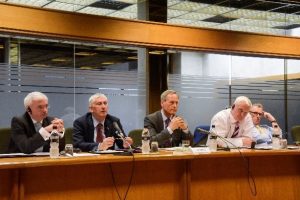

Uruguay making drug policy reform efforts
The Members of the UK Delegation which visited Uruguay in September 2016 had a variety of interests, and it was only at two meetings that the focus was exclusively on drugs policy. We met the Special Committee on Addictions of the House of Representatives on 19 September. On 20 September we met Dr Juan Andres Roballo, President of the National Drug Board. and the Secretary-General, Lic. Diego Martin Olivera.
Uruguay’s policy of taking national control of all production and sale of cannabis is still in a very early phase of implementation, and it remains highly controversial politically. The Chair of the Committee on Addictions, Alvaro Dastugue, who is also an evangelical minister, is strongly opposed to the legalisation on the grounds that it sends a wrong signal to young people. There was vehement discussion among Committee members at our meeting, with the Committee apparently divided more or less equally between those for and those against. Two members, Juan Federico Ruiz and Sebastian Sabini, made a pragmatic case for the policy on the basis of harm reduction and human rights. They described legalisation and regulation as an “additional tool” in the struggle to minimise the harm caused by drugs, which had otherwise been failing.
At the meeting with the National Drug Board we were informed there were clear goals in terms of health and the rule of law. As to the process, bids had been invited for licenses to produce cannabis; 22 bids had been received, of which eleven were short-listed and two agreed. The authorities responsible for countering money-laundering had scrutinised the process. The production phase had now begun.
In terms of consumption, legitimate membership clubs were being established. We were assured that inspections indicated that people were abiding by the new law. (That we observed in one area of Montevideo a dismal drugs street scene does not invalidate the policy; the legislation is precisely a response to that very palpable problem). The register of citizens entitled to grow their own cannabis (under strict terms) was now open, with rigorous levels of security in terms both of fingerprinting those on the register and preserving personal confidentiality. Another register was for authorised membership of cannabis clubs. A third register of those eligible to buy cannabis from pharmacies was expected to open later this year. No one was permitted to be on more than one register. There would be equally rigorous regulation of the third register (with no minors or non-Uruguayan citizens eligible) and monitoring as thorough as for the financial services industry. Delay in opening the third register had been due to the unwillingness of many pharmacies, particularly in rural areas, to act as retail outlets; this problem had not been entirely solved, but there were now enough pharmacies for the scheme, including one significant chain.
An insight into the origins of the policy was provided at another meeting, with ex-President Mujica, who had personally driven the policy through the political and legislative process. He quoted Albert Einstein’s dictum that insanity consists in doing the same thing over and over again and expecting different results. Prohibition of the drugs trade had failed, with disastrous consequences for Latin America. Uruguay had never criminalised consumers, but had now decided to kick the traffickers out of the market. The policy was an experiment; it would be monitored carefully; it would be changed if necessary; other countries might improve upon it. They were starting with marijuana, which was the drug most used. The relatively small size of Uruguay seemed to make it feasible. The authorised crops would be grown on military land by private contractors. So far from promoting addiction, the aim was to reduce the harm to which an estimated 150-200,000 habitual consumers of cannabis were exposed. When the drugs trade was clandestine little could be done to reduce harm until it was too late. Legalisation was not a solution that the ex-President liked, but it was better than the previous situation.
We also learned from the Deputy Minister of the Interior, Mr Vasquez, that from the point of view of his Ministry legalisation and regulation was desirable in dealing both with money-laundering and with the socially destabilising consequences of financial crisis (including increased use of cocaine and crack cocaine).













